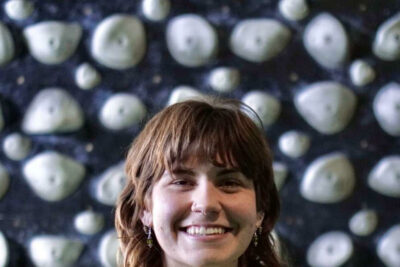In today’s society, there seems to exist a push to look forward. We are urged to march onward in the name of progress, looking for the next discovery, the next adventure and to never look back at our past—at the things that have enabled us to get to where we are and who we are.
Sometimes, despite that urge to move forward and ignore the past, individuals recognize the importance of the past, and work to ensure that traditions are maintained. As a result, cultural heritage is transpired, and people do something we don’t always do well: remember and carry it with us.On Wednesday nights at 6 at College Mennonite Church, tradition is alive and well. The group, Passing on Traditions, also known as Soup and Sewing, began in 2008 in an effort to connect the church and the college and to keep the tradition of quilting alive in the minds of younger generations.
The idea stemmed from the 2008 Goshen College May term musical “Quilters,” which tells the stories of frontier women and their lives in a new place as it applied to the creation of their quilts. The cast of “Quilters” made a quilt as a bonding activity and a way to get into the minds of their characters.
Doug Caskey, professor of theater, and Deb Brubaker, professor of music, were co-directing this play when the idea hit Brubaker. She had been quilting as a hobby and knew that there were other women in the church who not only knew how to quilt, but were passionate about it. College Mennonite Church (CMC), where Brubaker attended at the time, had been looking for a way to connect more with college students, and a tradition was born.
The group is comprised of church and community members as well as college students. Edna Reed, a member of CMC and a retired nurse, has a passion for quilting and is the current coordinator of the group. Becky Horst, associate registrar and convocation coordinator, is the liason between the college and CMC.
The group meets once a week on Wednesday nights and has branched out to much more than just quilting. They are currently knotting comforters and offering individual instruction in knitting, crocheting, and embroidery. The group also breaks bread together, literally. At each meeting there is soup, bread, learning and fellowship.
People grab their nametags, a bowl of soup, and sit at a table. Some people always knot comforters, some always quilt, some hop around. People are free to choose their crafts.
The products of this fellowship are donated to the Mennonite Central Committee (MCC), refugee families or victims of natural disasters. Quilts are often donated to the MCC Relief Sale.
David Jost, a senior, has been in the Traditions group for about three years. He said that it is “a great way to learn an arts and crafts tradition, spend some time with adults from the church and get some good food.”
Horst said the group is also just a great way to learn a practical skill. They sometimes teach basic sewing, and there are always sewing machines so people can use them to sew drawstring backpacks that will soon hold school or medical supplies for MCC, or serve as bags that will be given to other churches for their various needs.
Horst also said that there has been a resurgence of interest in handmade items. This seems to be a way to counter the cheap, mass produced things that are all around us, she said. Students in this group can learn to make items by hand and put a personal stamp on the products.
Quilting, knotting, embroidering, crocheting, and knitting are all various parts of the traditions CMC seeks to uphold and pass on.
Becky states that “quilting and knotting are traditions that are being passed on, but so is the idea that we can use an ordinary ability to bring beauty and comfort to the lives of ordinary people, that we can make a difference even with something as ordinary as a blanket. The traditions of practical service are something that needs to be passed down to each generation, because sometimes they can just be taken for granted.”
So she invites everyone to come out–people of any and all skill levels are welcome, from beginners to experienced, to join in the fellowship and weave together cloths and story, and to participate in living tradition.
